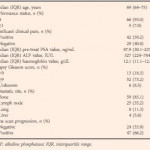Editorial: What is behind the flare phenomenon?
In the present issue of BJUI, Shiota et al. [1] propose a potential explanation for the PSA ‘flare’ observed in many patients as they initiate docetaxel chemotherapy. The PSA flare or ‘surge’ phenomenon has been noted for years, and may affect up to one-fifth of patients treated with docetaxel. Multiple reviews have concluded that the development of flare does not influence disease-specific outcomes [2, 3], which is further supported by the present paper [1]. However, there are no pragmatic analyses of how this flare is interpreted in real-world practice. As treatment of prostate cancer becomes more complex, and definitions of progression on treatment continue to evolve, practitioners must be aware of this laboratory pattern to avoid unnecessary discontinuation of therapy based on early PSA change alone.
The cause of such flare has only been postulated. Many suggest that it could be caused by PSA release from lysed cells or by aberrant androgen receptor (AR) activation, but other theories are also proposed. The present paper supports the hypothesis that transactivation of the AR by corticosteroids contributes to the flare. Further translational work may provide additional insight into this mechanism, but we have long discussed the influence of steroid administration on the AR. Similar flare phenomena have been observed with cabazitaxel [4] and abiraterone acetate, two regimens that are reliant on concomitant steroid use. Interestingly, patients in the present cohort treated with steroids before treatment initiation had less flare. This is a unique observation in that steroid activation may occur, but at an earlier time point, mitigating the coincidental rise when starting chemotherapy. Just as one must be aware of the existence of flare to avoid premature abandonment of a regimen, perhaps we now must take into account previous steroid use and interpret a PSA rise slightly differently. The present work is certainly hypothesis-generating and larger series may offer additional insight.
Recent data have shown significant survival gains using docetaxel in the hormone-sensitive metastatic setting, in which patients received chemotherapy without daily prednisone use [5]. Practitioners may find themselves managing patients on docetaxel chemotherapy who may or may not be taking corticosteroids. These recent data will probably also contribute to a ‘resurgence’ of sorts in the use of chemotherapy, and remembrance of the flare is important. We may find ourselves interpreting PSA flare in multiple steps: we will assess the agent (i.e. a taxane) and the use of prednisone (i.e. present prior to treatment or initiated at the start) and then interpret the results accordingly. The work of Shiota et al. in this observational study continues to highlight the flare phenomenon and the fact that the use of steroids before, or during, chemotherapy may further complicate our approach to the care of patients on chemotherapy. The field is moving forward and, as we work to understand the intricacies of PSA response, we also create more and more reliance on providers to really marry the art and science of medicine.



